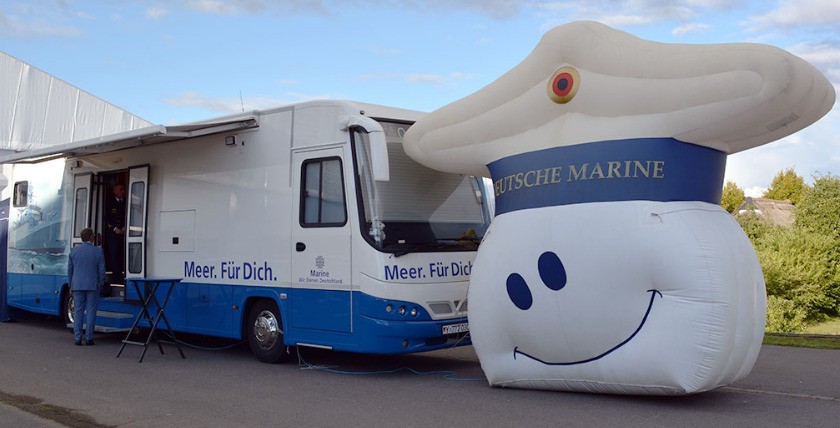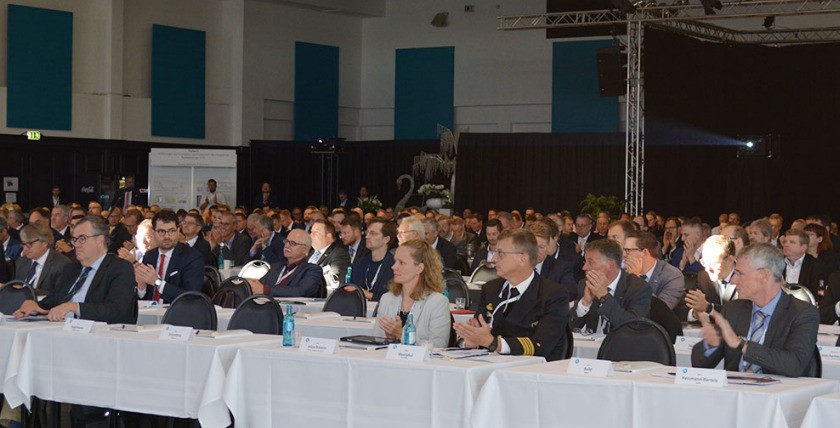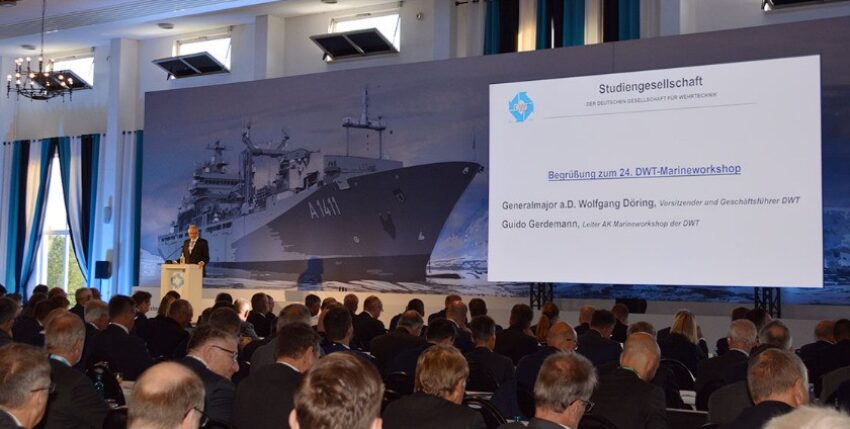With the return of politics to national and alliance defence, new tasks arise for the navy. At the DWT naval workshop in Linstow, known problems, particularly in procurement, were emphasised.
For the 24th time, DWT organised the Marine Workshop. Between 19 and 21 September, the navy, the public sector, research and industry were offered a platform for dialogue, information and communication in Linstow. More than 500 stakeholder representatives accepted the invitation to the Van der Valk Resort Linstow. The participants obviously enjoyed the opportunity for real-life encounters and professional dialogue.
Under the direction of Guido Gerdemann, Managing Director of the Hamburg-based company MTG Marinetechnik, this year's participants were asked to "think utilisation into the future" - for the benefit of material operational readiness and the future viability of the fleet. The tried-and-tested format of keynote speeches and poster sessions was used to set the tone and impart knowledge. As in previous years, the national armaments director, Vice Admiral Carsten Stawitzki, juggled with budget figures and armaments projects. He presented two projects to illustrate the tension between material readiness, for which the budget includes 5.4 billion euros plus an additional sum for research and development to eliminate obsolescence. On the one hand, the elimination of obsolescence and the maintenance of the Class 123 frigate's capabilities, which was contracted last year. On the other hand, the obsolescence elimination of the Class 125 frigate is already being planned and budgeted for, although the units are not yet fully in service. Stawitzki did not fail to mention other problem children such as infrastructure, ammunition and command and control capability. In the case of the Bundeswehr Special Fund, he explained the challenge of coordinating action between the corresponding Special Fund tubes, which are managed in a separate business plan, and the Individual Plan 14. In this respect, the parties involved are in a learning process. This made it clear to the listener why there is a problem with implementation and why the majority of the projects under discussion have not yet been finalised in the form of a (preliminary) contract.
Paradigm shift
For the navy, Vice Admiral Frank Lenski, Deputy Inspector General of the Navy and Commander of the Fleet and Support Forces, explained the challenges posed by the armed forces' return to national and alliance defence. This means a paradigm shift for the armed forces, which have been geared towards crisis management and optimised for foreign missions in recent decades. The capabilities required for air defence/defence have largely "degenerated" and require considerable revitalisation. However, the problems lie less with the personnel. The crews of the floating, diving and flying fleets are motivated and committed to the challenge. Rather, the problem lies in the units' level of equipment. This is far below the ideal level of two thirds. In order to get closer to this goal, the navy has launched a programme called Route 66, at the end of which the required number of ships and boats will be available for training and deployment. This will enable the fleet to fulfil its obligations to NATO in the long term. However, the turnaround is not possible without a substantial increase in maintenance capacity. The acquisition of the Warnowerft naval arsenal should be seen against this backdrop - a necessary step to improve the fleet's operational readiness in the long term. The aim is to strengthen the existing fleet and move away from the approximately 3,400 days of operation "that we are stuck in the naval arsenal". Finally, the modernisation of the fleet must not be lost sight of. The defence budget in its current form cannot afford the necessary armaments-intensive projects. In this respect, new construction projects are only made possible by the special assets of the Bundeswehr.

In his keynote speech, Tim Wagner, Managing Director of Naval Vessels Lürssen, signalled his understanding for the concerns and needs of the navy when it comes to increasing material operational capability. He painted a picture of the shipyards as contractors for a scheduled maintenance programme. The first challenge is the short lead time between the decision to award the contract and the arrival of the unit at the shipyard. This is because subcontractors cannot be engaged and orders placed until the order has been received at the earliest. And it is only when the unit arrives at the shipyard that the actual scope of the repair work becomes clear. Unplanned work that is deemed necessary in the course of the project leads to delays because this work has to be renegotiated. The shortage of skilled labour also contributes to any extension of the shipyard's laytime. Wagner addressed the "best price" award practice for Bundeswehr contracts and referred to other federal authorities whose solutions are more effective - best value for money. The challenges culminate in the case of an unplanned repair. According to Wagner, the procurement guidelines make it impossible to award contracts for immediate repairs quickly.

Every year, the naval fan community meets again in Linstow. Every year this happens in the hope that the incantations of the last, penultimate and penultimate time have found their way into reality. That light will dawn for the navy, which will finally order its units to missions according to operational conditions rather than according to the availability dictated by material maintenance and repair schedules.
The 24th naval workshop will not change this for the time being. The triangle of influence between the Federal Office of Bundeswehr Equipment, Information Technology and In-Service Support, industry and the navy clearly needs more than the reform of procurement law that came into force at the beginning of 2020. It has not yet had any effect, and faster contract awarding for repairs remains a dream goal, as is the case with procurements. The amendment to the law on key technology is also more of a smokescreen than a significant change to maintenance and procurement projects. The positive appraisal of the Bundeswehr Procurement Acceleration Act by NVL boss Wagner in his key note does not really help.
Exploring possibilities
As in other areas of society and politics, there is no lack of diagnosis. Stakeholders have been aware of the potential for improvement for some time now. Observers are left with the impression that the focus is more on correct implementation of the law than on exploring what is possible within the legal framework. Procedures are being followed, not targets. Simply introducing new legal requirements or moving organisational boxes is not enough. You have to tackle the processes! A few years ago, Hans-Peter Bartels, Member of the German Bundestag and Commissioner for the Armed Forces, said: "The regulation of everything and everyone through thousands of self-made Bundeswehr regulations stifles the principle of leadership with a mission." Similarly, Jens Obermeyer, Chairman of the Technical Service of the Bundeswehr, emphasised in an interview with SWR in March of this year that the excessive bureaucracy and requirements of recent decades were the real obstacles to ordering and procurement processes.
A long overdue impetus from Berlin is needed from both industry and the German Armed Forces Procurement Agency. Perhaps the cranes that stop over around Linstow on their way to the wintering grounds will help - in the spirit of Friedrich Schiller.
Hans-Uwe Mergener







